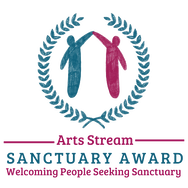New Tongues
Audrey Ilwyn
My first tongue has always been one of silence,
of stutters and strange noises,
words others can’t comprehend
that were crushed, fractured, stressed, compressed, thinned, swollen
broken
on the way from my mind to my mouth.
My first tongue is
a language that I am not comfortable in,
yet it has always been identifiably mine,
and not identifiably much else.
I have a new tongue now,
wrought in therapy sessions and tongue twisters and other people’s laughter.
Some days, I’m not confident it will be there when I open my mouth.
Some days, the words still get mangled.
Most days, though,
people just think I have an accent.
They ask, ‘Where are you from?’
‘How did you learn so much vocabulary?’
‘You’re very good at English, you know.’
It’s progress, but it doesn’t feel good.
So I move to other places, where they ask me
the same questions
but in different idiomas, hizkuntzak, 言語, línguas, jazyky.
I build homes in places where the language is not supposed to fit me.
Where I’ve put down my suitcase
but will always carry an aura of foreignness.
At best, I have an unplaceable accent
that makes people hesitatingly ask what tongues I speak and where I’m from.
But at worst, when I open my mouth,
I cannot communicate.
The words become distorted;
the conversation falls quiet.
A shrug. Laughter.
In the miscommunication, there is comfort.
These foreign tongues are familiar.
I know how they feel in my mouth
and what to do when they don’t work.
I am not scared by the idea of using them.
It is a homely place to be.
of stutters and strange noises,
words others can’t comprehend
that were crushed, fractured, stressed, compressed, thinned, swollen
broken
on the way from my mind to my mouth.
My first tongue is
a language that I am not comfortable in,
yet it has always been identifiably mine,
and not identifiably much else.
I have a new tongue now,
wrought in therapy sessions and tongue twisters and other people’s laughter.
Some days, I’m not confident it will be there when I open my mouth.
Some days, the words still get mangled.
Most days, though,
people just think I have an accent.
They ask, ‘Where are you from?’
‘How did you learn so much vocabulary?’
‘You’re very good at English, you know.’
It’s progress, but it doesn’t feel good.
So I move to other places, where they ask me
the same questions
but in different idiomas, hizkuntzak, 言語, línguas, jazyky.
I build homes in places where the language is not supposed to fit me.
Where I’ve put down my suitcase
but will always carry an aura of foreignness.
At best, I have an unplaceable accent
that makes people hesitatingly ask what tongues I speak and where I’m from.
But at worst, when I open my mouth,
I cannot communicate.
The words become distorted;
the conversation falls quiet.
A shrug. Laughter.
In the miscommunication, there is comfort.
These foreign tongues are familiar.
I know how they feel in my mouth
and what to do when they don’t work.
I am not scared by the idea of using them.
It is a homely place to be.
Audrey Ilwyn lives in the Spanish Basque Country with her partner and some extremely resilient house plants. When not writing, she spends her time studying languages and dance.


